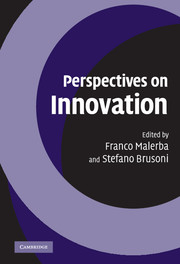Book contents
- Frontmatter
- Contents
- List of figures
- List of tables
- List of contributors
- Prefatory note
- Introduction
- Part 1 Innovation and economic growth
- Part 2 The microdynamics of the innovation process
- Part 3 Innovation and industrial dynamics
- Part 4 Innovation and institutions
- Part 5 Innovation, firms' organization, and business strategies
- 9 Bringing selection back into our evolutionary theories of innovation
- 10 From leadership to management: mobilizing knowledge for innovation in strategic alliances
- Comments to Chapters 9 and 10
- Part 6 Innovation and entrepreneurship
- Part 7 Innovation and evolution of the university system
- Part 8 Innovations and public policy
- Index
9 - Bringing selection back into our evolutionary theories of innovation
Published online by Cambridge University Press: 06 January 2010
- Frontmatter
- Contents
- List of figures
- List of tables
- List of contributors
- Prefatory note
- Introduction
- Part 1 Innovation and economic growth
- Part 2 The microdynamics of the innovation process
- Part 3 Innovation and industrial dynamics
- Part 4 Innovation and institutions
- Part 5 Innovation, firms' organization, and business strategies
- 9 Bringing selection back into our evolutionary theories of innovation
- 10 From leadership to management: mobilizing knowledge for innovation in strategic alliances
- Comments to Chapters 9 and 10
- Part 6 Innovation and entrepreneurship
- Part 7 Innovation and evolution of the university system
- Part 8 Innovations and public policy
- Index
Summary
Introduction
Organization innovation, from an evolutionary perspective, involves at least three distinct challenges: problems of competence, problems of variety, and problems of selection. Both capabilities and selection are inherently organizational phenomena. However, while the field has developed a deep commitment to the first of these two propositions (Nelson and Winter, 1982), we are only beginning to fully appreciate the latter. After a brief review of the challenges of competence and variety, I consider some of the intellectual challenges that we face in incorporating issues of selection in our models and analyses of organizational innovation.
A few basic issues are highlighted. First, heterogeneity in selection criteria across organization is a function of the demand environments in which firms operate and that organizations, failing to engage in selective intervention, inevitably restrict the variety of selection criteria imposed on innovative initiatives. Second, selection forces internal and external to the firm operate not only on fully realized development efforts, but on intermediate forms. Selectable traits that are favored by intermediate selection need not be associated with properties of initiatives that, if allowed to reach that ultimate realization, are associated with high levels of technical or economic performance. This issue of the need for intermediate selection is applied to provide a critical perspective on recent interest in the use of real options as an analytical solution to the problem of making investments in the face of uncertain futures. The notion of search is central in behavioral theories of the firm (March and Simon, 1958; Cyert and March, 1963) and in evolutionary arguments regarding technical advance (Nelson and Winter, 1982).
- Type
- Chapter
- Information
- Perspectives on Innovation , pp. 293 - 307Publisher: Cambridge University PressPrint publication year: 2007



